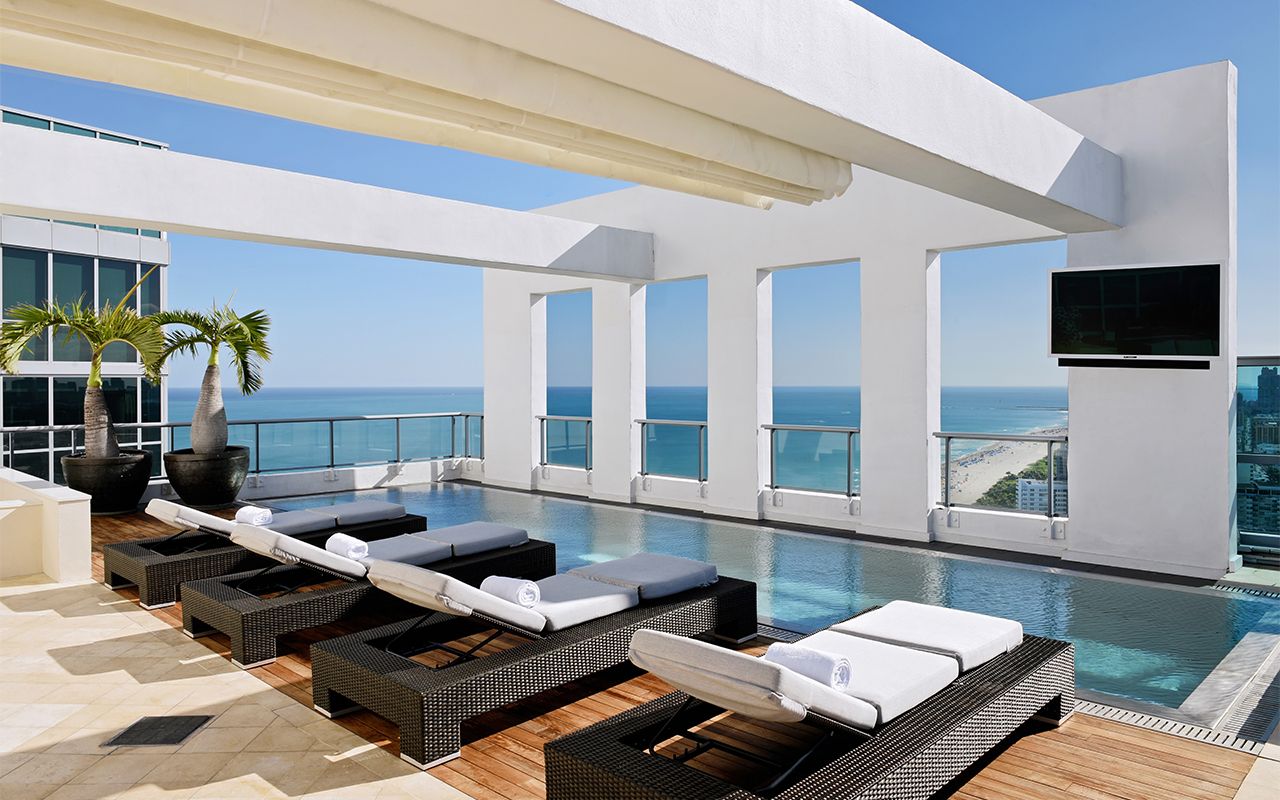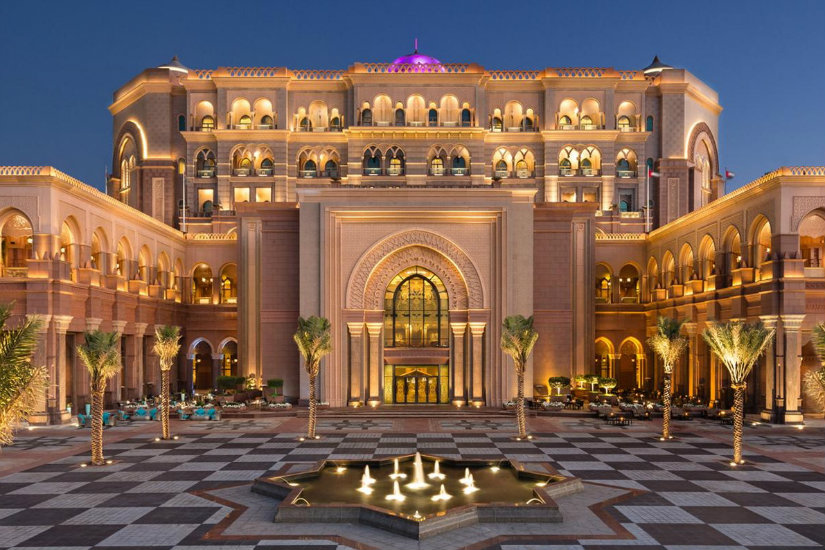World’s most luxurious hotels providing unforgettable experiences and memories—that’s the promise, and boy, do they deliver! From breathtaking architecture and personalized service to Michelin-star dining and once-in-a-lifetime adventures, these havens of opulence redefine luxury travel. Imagine sinking into plush beds after a day exploring ancient ruins, or sipping handcrafted cocktails while gazing at a panoramic ocean view. This isn’t just a stay; it’s a curated journey designed to create memories that will last a lifetime.
This deep dive explores what truly constitutes an unforgettable experience, examining the unique amenities, incredible locations, and personalized service that set these hotels apart. We’ll compare and contrast some of the world’s finest establishments, uncovering the secrets to their success and exploring the impact of everything from sustainable practices to architectural design on the overall guest experience. Get ready to be inspired – and maybe even start planning your next luxurious escape.
Defining “Unforgettable Experiences”: World’s Most Luxurious Hotels Providing Unforgettable Experiences And Memories
Unforgettable experiences at luxury hotels transcend mere comfort; they are meticulously crafted moments that resonate deeply, leaving a lasting impact on the guest’s psyche. These experiences are not simply about the opulence of the surroundings, but about the creation of memories – moments of profound connection, rejuvenation, or adventure that elevate the stay from a vacation to a transformative journey.
They are built on a foundation of personalized service, exceptional attention to detail, and access to unique opportunities unavailable elsewhere.Unforgettable experiences in luxury hotels encompass a wide spectrum of possibilities, catering to diverse tastes and preferences. The common thread is the creation of a truly personalized and exceptional journey, tailored to the individual guest’s desires. This could involve thrilling adventures, profound relaxation, or a deep immersion in local culture.
The key is the seamless integration of luxury, personalization, and a genuinely unique offering.
Types of Unforgettable Experiences
Luxury hotels craft unforgettable experiences by offering diverse activities and services. These experiences can be broadly categorized into adventure, relaxation, and cultural immersion, each offering unique opportunities for creating lasting memories. The hotels often combine these elements to provide a holistic and enriching experience.
| Experience Type | Description | Example Hotel | Unique Selling Point |
|---|---|---|---|
| Adventure | Thrilling activities that push boundaries and create adrenaline-fueled memories. This could involve guided hikes, private helicopter tours, or exclusive access to adventurous excursions. | The Brando, French Polynesia | Private access to pristine lagoons and unique opportunities for water sports and exploration. |
| Relaxation | Focuses on rejuvenation and tranquility, offering guests a chance to unwind and de-stress. This could include spa treatments, private yoga sessions, or simply enjoying the serene atmosphere of the hotel. | The Ritz-Carlton, Rancho Mirage | Luxurious spa facilities with a focus on holistic wellness and breathtaking desert views. |
| Cultural Immersion | Provides opportunities to connect with the local culture, history, and traditions. This might involve private cooking classes, guided tours of historical sites, or interactions with local artisans. | Amanpuri, Phuket | Unique cultural experiences tailored to guests’ interests, offering insights into Thai art, cuisine, and traditions. |
| Personalized Service | Highly personalized attention to every detail, catering to individual needs and preferences. This includes bespoke itineraries, dedicated concierge services, and anticipating guest needs before they are even voiced. | Burj Al Arab Jumeirah, Dubai | Unparalleled personalized service with dedicated butlers catering to every whim. |
Luxury Hotel Amenities & Services

Stepping into a world-class hotel is more than just checking in; it’s an immersion into a realm of unparalleled luxury and personalized service. These havens of opulence go beyond the basics, offering an array of amenities designed to cater to every whim and elevate the guest experience to extraordinary heights. From private butlers to Michelin-starred dining, the details are meticulously crafted to create unforgettable memories.The competitive landscape among top-tier hotels fuels a constant innovation in amenities, pushing the boundaries of luxury and personalization.
The world’s most luxurious hotels craft unforgettable experiences, from Michelin-starred dining to breathtaking views. A crucial element of this unparalleled luxury is often found in the exceptional spa facilities, and for the ultimate pampering, check out these ultimate luxury hotels worldwide offering unparalleled spa experiences ; their treatments are designed to elevate your stay to a truly memorable level.
Ultimately, these hotels redefine what it means to indulge, leaving you with memories to last a lifetime.
Each establishment strives to offer a unique and unforgettable experience, differentiating itself through bespoke services and exclusive features that cater to the discerning traveler’s desires. This competitive spirit ensures a consistently high standard of excellence across the industry.
Unique and Luxurious Amenities in World-Class Hotels
Luxury hotels are renowned for their ability to anticipate and exceed guest expectations. Consider the Burj Al Arab Jumeirah in Dubai, known for its helipad and fleet of Rolls-Royces for guest transportation. The Aman resorts, scattered across idyllic locations globally, offer personalized itineraries curated by expert concierges, incorporating private yoga sessions, guided nature walks, and bespoke cultural experiences.
The Cheval Blanc Randheli in the Maldives provides access to a private lagoon, complete with overwater bungalows and a dedicated team to arrange private dining experiences under the stars. These examples highlight the extraordinary lengths these hotels go to in creating truly memorable stays. Beyond these, many hotels offer personalized aromatherapy, private in-room spas, and curated art collections within the hotel itself.
Comparison of Amenities Across Top-Tier Hotels
While many top hotels offer similar high-end amenities, subtle differences create distinct experiences. For instance, while both the Four Seasons and the Ritz-Carlton are known for impeccable service, the Four Seasons might emphasize a more residential feel, focusing on spacious suites and personalized butler service, while the Ritz-Carlton may lean towards a more classic, grand style with a focus on refined elegance and curated experiences.
The Peninsula Hotels are celebrated for their cutting-edge technology, often integrating smart room controls and high-speed internet access seamlessly into the luxurious experience. These nuances cater to different preferences, making the choice of hotel a reflection of the individual traveler’s taste and expectations.
Top 10 Most Sought-After Amenities Among Luxury Travelers
Luxury travelers prioritize experiences that enhance comfort, convenience, and exclusivity. The following list reflects the most consistently sought-after amenities:
- Personalized butler service
- Private airport transfers
- Spacious and well-appointed suites
- Michelin-starred dining options
- Access to exclusive amenities (e.g., private pools, spas)
- High-speed internet access and advanced technology integration
- Curated experiences (e.g., private tours, cooking classes)
- Exceptional concierge services
- State-of-the-art fitness centers and wellness facilities
- Impeccable and anticipatory service from all staff
These amenities, while individually luxurious, collectively contribute to an unparalleled travel experience, solidifying the hotel’s reputation and attracting discerning guests seeking the ultimate in comfort and personalized service.
Location and Destination Impact
The location of a luxury hotel is far more than just an address; it’s the foundation upon which an unforgettable experience is built. The surrounding environment, cultural context, and accessibility all contribute to shaping the overall guest journey, influencing everything from the activities offered to the very atmosphere within the hotel walls. A hotel nestled in the heart of a bustling metropolis offers a drastically different experience compared to one secluded on a pristine beach or perched atop a mountain peak.Location plays a crucial role in defining the unique character of a luxury hotel.
It dictates the type of activities available to guests, the level of seclusion or engagement with local culture they can expect, and even the design aesthetic of the hotel itself. A hotel’s location can elevate its appeal, attracting a specific clientele drawn to the destination’s unique allure. This synergy between hotel and location is key to crafting truly exceptional and memorable stays.
Iconic Hotel Locations and Their Unique Characteristics
Several iconic hotel locations worldwide stand out due to their inherent charm and ability to enhance the guest experience. The Burj Al Arab Jumeirah in Dubai, for instance, is renowned not only for its opulent interiors but also its breathtaking location on an artificial island, offering unparalleled views of the Arabian Gulf. The iconic Plaza Hotel in New York City, situated amidst the vibrant energy of Fifth Avenue, provides guests with immediate access to world-class shopping, Broadway shows, and iconic landmarks.
Meanwhile, a secluded resort like the Four Seasons Landaa Giraavaru in the Maldives offers an entirely different experience, centered around pristine beaches, turquoise waters, and an immersive connection with nature. Each location offers a unique canvas upon which the hotel experience is painted.
Comparative Analysis of Luxury Hotel Locations
The following table compares three luxury hotels in vastly different locations, highlighting how the location directly impacts the guest experience.
| Hotel Name | Location | Unique Location Features | Impact on Guest Experience |
|---|---|---|---|
| The Ritz Paris | Paris, France | Central location near iconic landmarks like the Eiffel Tower and Louvre Museum; vibrant cultural scene; sophisticated Parisian atmosphere. | Guests enjoy easy access to world-class museums, art galleries, shopping, and dining. The Parisian ambiance permeates the hotel experience, adding a touch of elegance and romance. |
| The Oberoi Udaivilas | Udaipur, India | Picturesque setting on the banks of Lake Pichola; stunning views of the Aravalli hills; rich cultural heritage of Rajasthan. | Guests immerse themselves in the rich culture and history of Rajasthan. The serene lakefront location provides tranquility and breathtaking views, enhancing relaxation and creating a memorable escape. |
| The Brando | Tetiaroa, French Polynesia | Private island setting in the South Pacific; pristine beaches; crystal-clear turquoise waters; abundant marine life. | Guests experience unparalleled seclusion and tranquility in a breathtaking natural paradise. The focus is on relaxation, water sports, and connection with nature, offering a truly exclusive escape. |
Personalized Service and Guest Relations
In the realm of ultra-luxury hospitality, personalized service transcends mere attentiveness; it’s the cornerstone of creating truly unforgettable experiences. It’s about anticipating needs before they’re voiced, remembering preferences from previous stays, and crafting bespoke moments that resonate deeply with each individual guest. This level of individualized attention fosters a sense of valued belonging, transforming a simple hotel stay into a cherished memory.Exceptional personalized service elevates the guest experience from transactional to deeply personal.
The world’s most luxurious hotels craft unforgettable experiences, from Michelin-starred dining to private beach access. Planning a solo trip? Check out this ultimate guide to the world’s best luxury hotels for solo travelers to find the perfect sanctuary for your next adventure. These opulent escapes promise memories you’ll cherish for a lifetime, offering personalized service and breathtaking locations.
It’s the difference between a pleasant stay and a truly transformative journey. This dedication to individual needs is what sets luxury hotels apart, turning them into havens of bespoke pampering and unforgettable moments.
Examples of Exceptional Personalized Service
Luxury hotels employ a multitude of strategies to personalize the guest experience. These range from pre-arrival consultations to meticulously curated in-room amenities and thoughtful gestures throughout the stay. Consider the Ritz-Carlton’s legendary “1-to-1” service, where dedicated staff members learn guest preferences and proactively cater to their needs. Or the Four Seasons’ ability to arrange private yacht excursions or bespoke culinary experiences tailored to individual tastes.
These hotels don’t just meet expectations; they exceed them, anticipating desires and proactively fulfilling them with seamless elegance.
A Personalized Guest Experience: From Arrival to Departure
Imagine a guest, Ms. Eleanor Vance, arriving at a fictional luxury hotel, “The Azure Coast.” Upon arrival, her name is displayed on a welcome screen, and a personalized welcome note, signed by the hotel manager, awaits in her suite, along with a selection of her favorite teas and a bouquet of her preferred flowers (lavender, per her profile from a previous stay).
During her stay, her preferred newspaper is delivered each morning, along with a small plate of her favorite pastries. The concierge anticipates her interest in local art and arranges a private tour of a nearby gallery, securing exclusive access for her. In the evening, a personalized turndown service includes a selection of books aligned with her literary interests, discovered through a subtle pre-arrival conversation.
On her departure, a personalized gift awaits – a locally crafted piece of jewelry reflecting the hotel’s design aesthetic, accompanied by a handwritten note expressing the hotel’s gratitude for her visit and invitation to return. This meticulously crafted experience transforms a simple hotel stay into a deeply personal and unforgettable memory for Ms. Vance.
Culinary Experiences and Gastronomy
The culinary landscape of a luxury hotel is far more than just sustenance; it’s an integral part of the overall experience, a symphony of flavors and aromas that elevates the stay from pleasant to truly unforgettable. The dining options offered, the quality of ingredients, and the artistry of presentation all contribute to a holistic sensory journey that resonates long after departure.
A world-class hotel understands this, investing heavily in exceptional chefs, sourcing the finest produce, and creating unique dining concepts that reflect both local culture and global trends.Culinary experiences are pivotal in defining a luxurious hotel stay because they engage multiple senses, creating lasting memories. The taste of exquisitely prepared dishes, the aroma of freshly baked bread, the sight of beautifully plated food, the sounds of clinking glasses and lively conversation – these elements combine to create an immersive and memorable experience.
Beyond the food itself, the ambiance of the restaurant, the impeccable service, and the carefully curated wine list all contribute to the overall feeling of opulence and indulgence. A truly luxurious culinary experience transcends simple dining; it becomes a form of art, a performance that caters to all the senses.
Culinary Styles at The Ritz-Carlton, Bali and Mandarin Oriental, Bangkok
The Ritz-Carlton, Bali, known for its stunning oceanfront location, offers a diverse culinary portfolio that showcases both international and Indonesian flavors. Their signature restaurant, for example, might feature innovative takes on traditional Balinese dishes, using locally sourced ingredients and modern culinary techniques. This approach blends the familiar comfort of traditional cuisine with the excitement of contemporary gastronomy. In contrast, the Mandarin Oriental, Bangkok, a city-center icon, focuses on a sophisticated mix of international fine dining and authentic Thai cuisine.
Their restaurants might offer Michelin-starred experiences alongside more casual settings, providing a range of culinary choices to suit various tastes and preferences. The contrast lies in the setting; one emphasizes the natural beauty of Bali, while the other showcases the vibrant energy of Bangkok. Both hotels, however, consistently deliver high-quality ingredients, impeccable service, and unique culinary perspectives.
An Ideal Culinary Journey at a Luxury Hotel
Imagine beginning your culinary journey with a light and refreshing afternoon tea, served in a sun-drenched conservatory overlooking a lush garden. The delicate aroma of Earl Grey tea mingles with the sweet scent of freshly baked scones and pastries. The afternoon progresses into a sophisticated dinner at the hotel’s award-winning restaurant. The amuse-bouche, a tiny bite of perfectly seared scallops, awakens the palate.
The main course, a pan-seared duck breast with a rich cherry reduction, is a masterpiece of flavor and texture. Each bite is a revelation, a symphony of tastes that dance on the tongue. The accompanying wine, a perfectly selected Bordeaux, complements the dish flawlessly. The evening concludes with a decadent dessert, a chocolate lava cake with a molten center, a final sweet note to a perfect culinary symphony.
The entire experience is a feast for the senses, a carefully orchestrated sequence of flavors, aromas, textures, and sights that linger long after the last bite.
Architecture and Design
The architecture and interior design of a luxury hotel are not mere aesthetics; they are integral to crafting an unforgettable guest experience. These elements contribute significantly to the overall atmosphere, shaping the emotional response and influencing the perception of luxury itself. From the grand scale of the building’s exterior to the minute details of the room’s décor, every design choice speaks volumes about the hotel’s brand and its commitment to providing exceptional comfort and sophistication.The architectural style employed significantly impacts the hotel’s character and ambiance.
Different styles evoke distinct emotions and create unique atmospheres. A neoclassical design, for instance, projects an aura of timeless elegance and grandeur, while a modern minimalist approach conveys sleek sophistication and understated luxury. The synergy between the architecture and the interior design is crucial; they must complement each other to create a harmonious and luxurious environment.
Architectural Styles of Famous Luxury Hotels
The architectural styles of luxury hotels are as diverse as their locations and target markets. The iconic Burj Al Arab in Dubai, for example, is a striking example of modern architecture, its sail-shaped structure a testament to innovative design and engineering. In contrast, the historic Savoy Hotel in London showcases Edwardian Baroque architecture, with its opulent detailing and grandeur reflecting a bygone era of refined luxury.
The Plaza Hotel in New York City, with its French Beaux-Arts design, epitomizes classic elegance and timeless sophistication. These diverse styles demonstrate how architecture can effectively communicate a hotel’s unique identity and appeal to a specific clientele.
Interior Design Elements of a Hypothetical Luxury Hotel
Imagine a hypothetical luxury hotel nestled amidst rolling hills overlooking a serene coastline. The interior design emphasizes a seamless blend of opulence and comfort, creating a sanctuary of tranquility and refined elegance. The color palette is inspired by the surrounding landscape, featuring soft, muted tones of creams, beiges, and greys, accented by pops of deep blues and greens reminiscent of the ocean and sky.
Natural materials such as polished marble, rich woods, and luxurious fabrics are used extensively, creating a sense of warmth and understated luxury. The lighting is carefully considered, with layered illumination providing a soft, ambient glow in the evenings. Natural light floods the spaces during the day, highlighting the textures and patterns of the materials. Crystal chandeliers add a touch of sparkle and glamour to the public areas, while bespoke lighting fixtures in the guest rooms create a more intimate and relaxing atmosphere.
Every detail, from the meticulously chosen artwork to the plush carpets underfoot, is intended to create an atmosphere of unparalleled comfort and sophistication. The overall effect is one of serene elegance, where guests can truly relax and unwind in luxurious surroundings.
Sustainability and Social Responsibility
The luxury hotel industry, once synonymous with opulent extravagance, is undergoing a significant transformation. Increasingly, discerning travelers are demanding more than just lavish accommodations; they seek experiences that align with their values, particularly those concerning environmental protection and social equity. Sustainability and social responsibility are no longer optional additions but integral components of a truly luxurious and desirable brand.
This shift reflects a broader societal awareness of the environmental and social impacts of tourism and a growing expectation that businesses, especially those at the high end of the market, take responsibility for their footprint.Luxury hotels are responding to this demand by implementing various sustainable practices, demonstrating that luxury and responsibility can coexist seamlessly. This evolution not only benefits the planet and local communities but also enhances the guest experience, creating a more meaningful and authentic connection with the destination.
Sustainable Practices in Luxury Hotels, World’s most luxurious hotels providing unforgettable experiences and memories
Many luxury hotels are proactively integrating sustainable practices into their operations. This includes energy efficiency measures such as installing solar panels and implementing smart energy management systems. Water conservation efforts, such as low-flow fixtures and rainwater harvesting, are also becoming commonplace. Furthermore, many are focusing on sourcing locally produced food and reducing food waste, supporting local farmers and minimizing their carbon footprint.
The use of eco-friendly cleaning products and sustainable building materials are further examples of commitment to environmental responsibility. Examples include the Four Seasons resorts, known for their extensive sustainability programs encompassing energy conservation, waste reduction, and community engagement, and the Fairmont Hotels & Resorts, which boasts a comprehensive sustainability initiative, focusing on reducing carbon emissions and water usage, and promoting responsible sourcing.
Integrating Sustainability Without Compromising Guest Experience
Integrating sustainable practices doesn’t require sacrificing the luxurious experience. In fact, many sustainable initiatives enhance the guest experience. For instance, locally sourced food translates to fresher, more flavorful meals, showcasing the unique culinary heritage of the region. Energy-efficient lighting and climate control systems contribute to a more comfortable and tranquil atmosphere. The use of natural materials in the hotel’s design creates a more aesthetically pleasing and calming environment.
Furthermore, highlighting a hotel’s commitment to sustainability through transparent communication with guests, such as showcasing their environmental initiatives in brochures or on their website, can create a sense of shared purpose and enhance the overall guest experience, demonstrating the hotel’s commitment to responsible luxury. A hotel might offer guests the option to participate in local conservation projects or donate to environmental causes, thus actively engaging them in the hotel’s sustainability efforts.
This not only strengthens the brand’s image but also fosters a sense of community and shared responsibility amongst guests.
Creating Lasting Memories

Luxury hotels don’t just offer opulent rooms and impeccable service; they craft experiences designed to resonate long after the guest departs. The true measure of a luxury stay isn’t just the physical comfort, but the emotional connection forged between the guest and the hotel. This connection transforms a simple vacation into a treasured memory, a story to be recounted and cherished for years to come.The intangible elements—the subtle gestures, the personalized touches, the genuine warmth of the staff—play a crucial role in cultivating these lasting emotional bonds.
It’s the feeling of being truly seen, understood, and cared for that elevates a stay from pleasant to unforgettable. These emotional connections are built not through grand gestures alone, but through a consistent dedication to exceeding expectations in small, meaningful ways.
Staff Interactions and Personalized Service
Exceptional staff training is paramount in creating lasting memories. Staff members should be empowered to anticipate guests’ needs and respond with genuine empathy and proactive service. For instance, remembering a guest’s preferred drink or anticipating their need for extra pillows before they even ask demonstrates a level of attentiveness that fosters a feeling of being valued and cared for.
Beyond basic service, staff should be trained to engage in meaningful conversations, showing genuine interest in the guests’ experiences and creating a sense of connection. A simple act like recommending a local restaurant based on the guest’s expressed interests can significantly enhance their overall experience and leave a lasting positive impression. Hotels might implement regular training sessions focused on emotional intelligence and guest relationship management to ensure staff consistently deliver exceptional personalized service.
Unexpected Gestures and Thoughtful Amenities
Unexpected gestures are powerful tools for creating memorable experiences. A complimentary bottle of champagne upon arrival, a handwritten welcome note, or a small gift reflecting the guest’s interests are examples of thoughtful touches that go above and beyond the expected. These surprise elements show that the hotel cares about the individual guest and is committed to providing a truly personalized experience.
One could imagine a hotel offering a curated selection of local artisanal products in the guest’s room, tailored to their preferences based on information gathered during the booking process. These gestures create a sense of delight and surprise, making the stay more special and memorable.
Initiatives to Enhance Emotional Impact
A luxury hotel could implement several initiatives to further enhance the emotional impact of a guest’s stay. For example, creating personalized itineraries based on guest preferences, offering bespoke experiences like private yoga sessions or cooking classes, or arranging surprise romantic dinners can all contribute to a more emotionally resonant experience. Additionally, the hotel could partner with local artists or musicians to offer unique cultural experiences, creating a deeper connection with the destination.
Furthermore, implementing a system for collecting guest feedback and using it to continuously improve the guest experience demonstrates a commitment to creating a truly unforgettable stay. These initiatives would not only improve guest satisfaction but also enhance the hotel’s brand reputation and create a loyal customer base.

